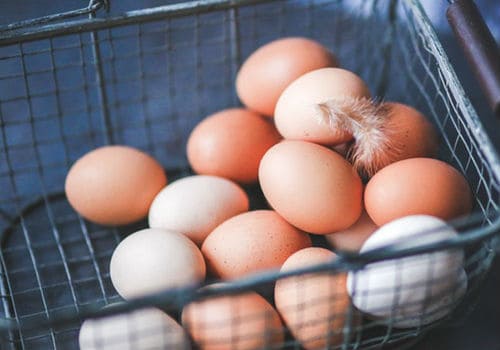Chickens are the easiest farm animal for a hobbyist to raise, and they can pay for their upkeep in eggs. Learning to raise your chickens requires a bit of research and a small learning curve, but once you get the hang of it you can have fresh eggs whenever you want them.
In order to raise your own chickens, you will need to consider several steps:
- Buying chickens
- Raising chickens
- Harvesting chicken eggs
Let’s look at each step in turn. This brief overview guide should help to push you in the right direction when it comes to raising your own backyard chickens.

How to Buy Chickens
Before you can start raising chickens for eggs, you’ll need to buy some chickens. There are a few different ways to go about this:
- You can buy adult chickens. Bear in mind that a hen’s fertility wanes after a few years. Chickens have a natural lifespan of 8 to 10 years, but they lay eggs only for about half of that time. If you’re buying a hen for eggs, you’ll want one young enough to lay for several more years. The best bet is to buy a “started pullet,” or young hen who has begun laying eggs. Depending on the breed, a pullet might cost around $30 to $50.
- You can buy chicks. Feed stores sell day-old chicks for about $3 per chick. These young birds are adorable but mostly helpless and will need to be kept in a heat-controlled brooder for a few weeks before moving them out to the coop. Expect to pay between $50 and $100 for a brooder setup unless you already have some of the supplies on hand, e.g., a heat lamp. Once the chicks turn about 6 months old, they’ll start laying eggs.
- You can buy fertilized eggs and hatch them yourself in an incubator. Each egg will cost between $1 to $3 on average. Depending on the type of incubator you choose, you’ll need to spend around $100 on an incubator. You’ll also need to be available to turn the eggs three to five times per day for three weeks. Once hatched, you’ll proceed to raise the chicks as if you had purchased them as hatchlings.
Aside from the age of the chicken you start with, there are a few other things you’ll need to consider:
- How many chickens do you want? If you live in a suburb or city, there may be city ordinances about how many chickens can be kept. Chickens are social animals, so you should never raise one in isolation. An ideal size for a starter backyard flock is between three and five birds. If you live in the country or have more time to start a proper farm, you may want more birds. You can always add more chickens later if you need to.
- Will you get a rooster? It is unnecessary to have a rooster; hens will lay eggs just fine without one. Roosters are also illegal in some places, and they can be a nuisance due to their crowing and sometimes aggressive natures. On the other hand, a rooster can help to protect the flock, and they are very amusing to watch. They can also usually be obtained for free through rehoming ads from other chicken fanciers.
- What breed do you want? There are many different chicken breeds that are good for laying eggs. Some factors to consider in choosing a breed include the chicken’s size and temperament. First-time chicken farmers should choose docile birds that will be easy to handle. The breed also determines how the chicken will look and the color of the eggs, so choose a bird that you find aesthetically pleasing if that is important to you.
If space is an issue, you can choose Bantam chicken varieties. These are smaller birds that take up less room and eat less food, making them cheaper to raise. The trade-off is that the smaller birds also lay small eggs so you may have a harder time selling the eggs for profit or eating them.
How to Raise Chickens for Eggs (Video)
What Does it Take to Raise a Chicken for Eggs?

Once you have the chickens themselves, you’ll need a place for them to live and something to eat. Fortunately, chickens are fairly simple creatures that keep easily, so you don’t need to get too fancy with the accommodations to have happy and healthy chickens.
A chicken lives in a structure called a coop. You can build your own chicken coop or buy one pre-made. Every coop will need a few essential parts:
- Roosting bars, spaced 18 inches apart, for the chickens to grip and rest on. The roosting bar should be above the level of the ground and made of a material the chicken can easily grasp.
- Nesting boxes, at least one per three birds. This is where the hens will lay their eggs. You’ll want these boxes to be easily accessible for egg collection each day.
- Feeders and waterers. Chickens are foragers, so they’ll need food and water to be accessible throughout the day. You can use waterers or “drinkers” with spigots to cut down on mess and keep the chickens from drowning in a trough or pool.
If you want to hatch your eggs, you’ll also need to buy an incubator. Young chicks will need a brooder, which can be as simple as a storage tub with bedding and a heat lamp.
A chicken coop needs to have two square feet of space inside per bird. There should also be a safe enclosed space of at least four square feet per bird outside the coop. You can buy or make a coop with an outdoor enclosure or allow the chickens to roam freely in your yard during the day. If you let your chickens roam free, beware that they can wreck your lawn, garden, and landscaping.
[amazon bestseller=”chicken coop”]
What Do Chickens Eat?

Chickens are omnivores that naturally eat many types of foods including vegetables, grains, fruit, insects and even small reptiles and mammals. Free-ranging chickens can find ample food in a pasture, where they can freely scratch and peck for food.
In a more urban setting, you’ll need to feed your chickens a steady diet of commercially prepared food. Look for pellets or crumbles at the feed store. These are nutritionally complete meals made from fortified grains that will contain enough protein, energy, and nutrients to sustain a laying hen.
You can supplement a chicken’s diet by providing scratch grains, which are whole grains like oats and other seeds that can be scattered on the ground. Foraging for scratch gives chickens some entertainment and exercise as well as nutrition.
[amazon bestseller=”scratch grains for chickens 50 lbs”]
Chickens may also need grit, which aids digestion. If your birds are free-range, they may get ample grit from eating small pebbles. Otherwise, you’ll need to provide commercial grit. A calcium supplement also helps with egg production. A coarsely broken oyster shell is a common choice for this purpose.
Chickens can have kitchen scraps as a treat and dietary supplement. Vegetable ends and peelings are a popular choice. You can feed your garden scraps to chickens in the summer rather than putting them in the compost heap.
However, it’s important not to overdo it with treats. Chickens can easily choke if they fill their crops with too much food too quickly. They can also face nutritional deficiencies if they eat too many treats and not enough nutritious food. Free-feed pellets and offer small portions of other foods on occasion.
How Much Does it Cost to Raise Chickens?
Your initial chicken start-up costs will depend on the type of chickens you buy, how much you spend on a coop, and whether you have any supplies that can be repurposed for chicken rearing. This means that the cost of raising chickens is highly variable.
Once you’ve gotten your flock set up, monthly expenses should be more predictable. An adult chicken will eat about a quarter pound of food per day. A 50-pound bag can range in price from $30 to $50 at the feed store.
You’ll also need to buy bedding and may need miscellaneous husbandry supplies such as lice powder. In general, you can expect to pay about $15 per chicken per month. With a larger flock, your per-chicken cost may decrease as many things will begin to scale.
How Many Eggs Can I Get a Year from My Chickens?

A single hen can lay as many as 300 eggs per year. On a backyard farm, you may see fewer than that, but you can usually reliably get an egg every day or two during the summer. There are a few things you can do to boost a chicken’s laying production:
- Buy a breed that’s known for being a good layer. All-purpose chicken breeds and fryers or meat breeds are not as efficient as egg breeds.
- Use artificial light in the coop to stimulate laying year-round. This is what commercial chicken farms do. Chickens naturally stop laying as days grow short in winter, but artificial lighting can extend the laying season.
- Feed a high-protein diet. Opt for laying pellets rather than an all-purpose food. The higher levels of protein and nutrition will make it easier and faster for a hen to produce an egg.
- Reduce stress. A stressed-out chicken will stop laying eggs. Keeping your chickens happy and healthy will ensure consistent egg production.
Bear in mind that chickens stop producing reliably by middle age. Once a hen starts laying after four or five years, you need to decide if you’ll keep her as a pet or have her butchered. Meat from older laying hens tends to be a bit tougher and gamier than what you may be accustomed to eating. They may be more useful for soup stock than meat.
How Much Money Can I Make From My Chickens?
If you sell your chicken eggs at the local farmer’s market or a similar venue, you can easily charge $5 or more per dozen. Organic grass-fed eggs are more nutritious than commercial eggs from the store, and people are willing to pay for that quality.
If you have a flock of six hens, you could potentially have a dozen eggs every two days, or about 40 eggs per week. If your chickens lay eggs year-round, you could earn about $800 from selling the eggs. Hens that lay only part of the year would result in a lower income; charging more for your eggs would result in a higher income.
One way to get more money from selling eggs is to keep a rooster on hand. That would allow you to sell fertilized eggs for $1 or more per egg. If you managed to sell 40 fertilized eggs per week at $1 per egg, you could make $2,000 in a year before expenses.
[amazon bestseller=”worms for chicken”]
Another way to profit from your chickens is to sell the chicken poop as fertilizer. Chicken droppings make for excellent garden fertilizer, and it may be in high demand from fellow backyard farmers.
As you can see, raising chickens on a small scale is hardly profitable. However, chickens can pay for themselves, making them a self-sustaining food source and entertaining pet or hobby.





Is there a video?